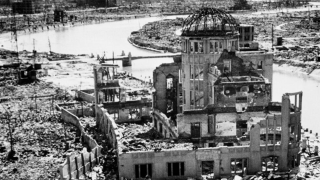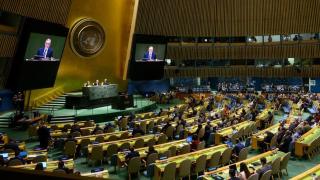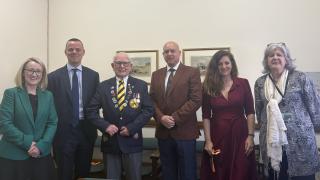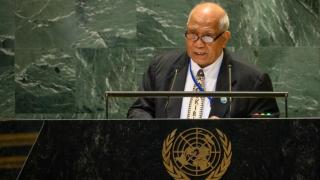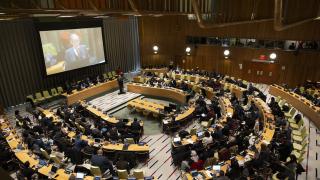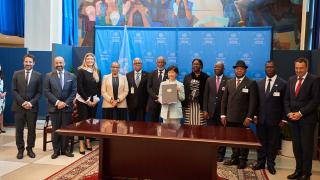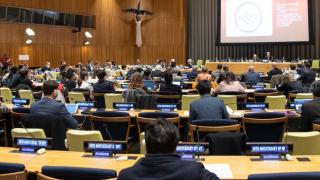
This month, the third and final session of the Preparatory Committee for the 2026 Review Conference of the Treaty on the Non-Proliferation of Nuclear Weapons (NPT) takes place at the United Nations Headquarters in New York.
This meeting comes at a time of heightened nuclear risk, deepening geopolitical divides, and increasing concern over the failure of nuclear-armed states to meet their disarmament obligations. The session offers a crucial opportunity for the United Kingdom and other nuclear-weapon states to demonstrate renewed commitment to the treaty and address the pressing challenges facing the global non-proliferation and disarmament regime.
What is the NPT?
The NPT, in force since 1970 and with 191 States Parties, remains the cornerstone of international nuclear governance. It is built on three interrelated pillars: preventing the spread of nuclear weapons, promoting the peaceful use of nuclear energy, and achieving nuclear disarmament. Review Conferences are held every five years to assess implementation, with Preparatory Committees convened in the interim. However, agreement at these forums has become increasingly elusive. The 2015 and 2022 Review Conferences both failed to produce consensus outcomes, while the 2024 PrepCom ended without substantive conclusions, reflecting growing frustration - particularly among non-nuclear-armed states - at the continued lack of progress on disarmament.
The UK and the NPT
The UK's role in this context is significant. As one of the five nuclear-weapon states recognised under the NPT, it bears a legal obligation under Article VI to pursue good faith negotiations towards nuclear disarmament. Continued UK participation in the NPT process is essential in demonstrating adherence to international norms and to contribute to the treaty’s long-term viability.The UK’s stance on commitments to the Treaty are outlined in their Draft National Report.
However, the credibility of the UK’s engagement with the NPT has increasingly been called into question. In recent years, the UK has taken decisions that are inconsistent with its NPT commitments. The 2021 Integrated Review announced an increase in the UK’s nuclear warhead cap and a reduction in transparency, prompting widespread concern. The UN Secretary-General has repeatedly warned that the continued modernization of nuclear arsenals by nuclear-armed states, including the UK, is inconsistent with the spirit of their disarmament obligations under the NPT. Moreover, despite previous engagement with civil society and support for initiatives such as a Fissile Material Cut-Off Treaty and the Comprehensive Nuclear-Test-Ban Treaty, the UK has in recent years adopted a more defensive and less constructive tone in multilateral disarmament forums.
A central point of tension is the UK’s continued rejection of the Treaty on the Prohibition of Nuclear Weapons (TPNW), which entered into force in 2021. The TPNW prohibits the development, possession, and use of nuclear weapons and includes novel provisions on victim assistance and environmental remediation. The UK argues that the TPNW is incompatible with the NPT and risks undermining its framework. However, many non-nuclear states and civil society actors see the TPNW as complementary, particularly in addressing humanitarian and environmental consequences neglected by the NPT. Countries such as Kiribati and Kazakhstan - both severely impacted by past nuclear testing, including that of the UK - have used recent NPT meetings to highlight these concerns and call for engagement with the TPNW’s provisions.
The UK has thus far dismissed such appeals, asserting that the appropriate framework for addressing testing impacts is the Comprehensive Nuclear-Test-Ban Treaty (CTBT). However, this stance ignores the TPNW’s unique contributions, particularly in mandating support for affected communities and remediation of contaminated environments. Kiribati and Kazakhstan’s 2023 working paper at the NPT PrepCom demonstrated the urgent need for action in this area, urging nuclear-armed states to take responsibility for past harms. Failing to acknowledge these efforts risks further eroding the NPT’s legitimacy and deepening divisions between nuclear-armed and non-nuclear-armed states.
Opportunities for UK engagement with global nuclear disarmament efforts
Despite these challenges, opportunities remain for the UK to demonstrate leadership in these contexts. UNA-UK has consistently called for the UK to adopt a more constructive tone towards the TPNW and to engage with its supporters. This could include attending TPNW meetings as an observer, offering technical input on verification and remediation, and providing support to communities affected by UK testing. Taking such steps would not require endorsing the TPNW but would signal a willingness to engage with global concerns and help rebuild trust in multilateral processes.
The 2025 PrepCom is a critical moment. The failure of recent Review Conferences has undermined confidence in the NPT, and growing dissatisfaction with the nuclear-armed states’ lack of progress on disarmament continues to mount. For the UK, demonstrating meaningful engagement - particularly on humanitarian issues, disarmament commitments, and constructive dialogue with TPNW states - would offer a path forward. Concrete actions, such as re-committing to transparency, reducing reliance on nuclear weapons in national security strategy, and engaging seriously with victim assistance, would strengthen the UK's standing and contribute to the treaty's long-term health.
The NPT remains a vital pillar of global security but only if its obligations are met in good faith. The UK must seize this opportunity to restore its credibility, respond to the calls of affected communities, and work constructively towards a world free of nuclear weapons. Failure to do so will not only damage the treaty’s future, but also the UK's reputation as a responsible actor in international security.
Read more:
- UNA-UK’s joint parliamentary event on nuclear harms.
- UNA-UK’s overview of the outcomes of the 3MSP to the TPNW.
- UNA-UK's briefing on The Treaty on the Prohibition of Nuclear Weapons.
Photo: 50th Anniversary of Treaty on Non-Proliferation of Nuclear Weapons. Credit: UN Photo/Eskinder Debebe

